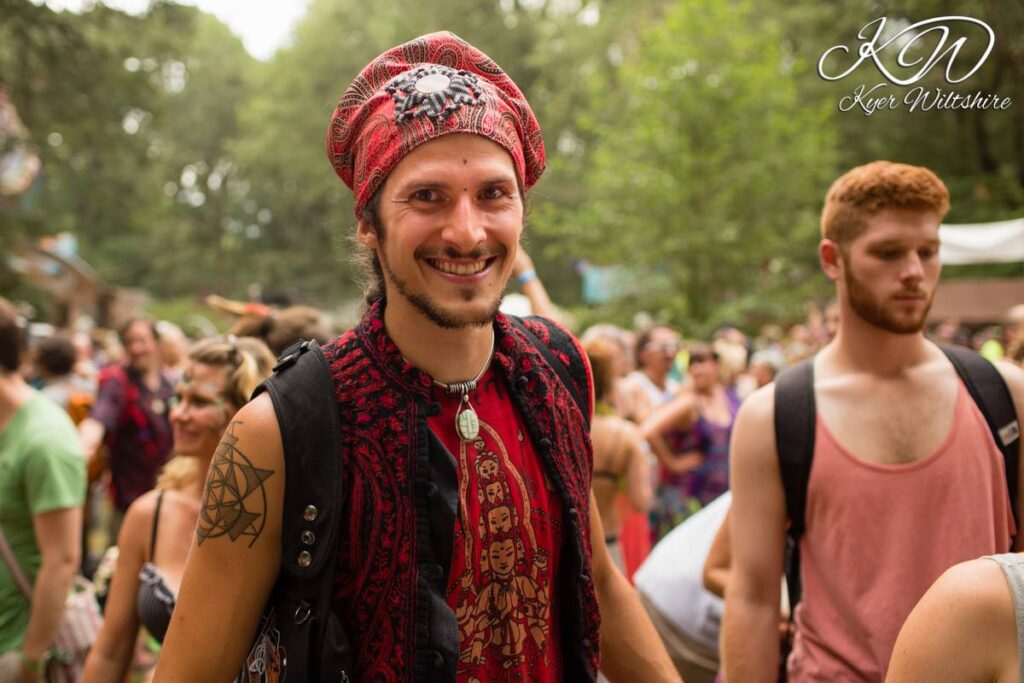
photo by Kyer Wiltshire
An Interview with Zan Moore, Founder of Pacific Fire Flow Arts Gathering
Zan Moore spends his time dancing with fire, attending festivals and producing Flow Arts events. He is well loved by all who know him, for his gentle nature as much as his fire dancing grace. He is one of the leaders who are helping Flow Arts to spread throughout the USA and one who takes the time to guide each new spinner to a deeper experience.
Pacific Fire is one of four affiliated major Flow Arts events in the USA with several smaller ones up and coming. This interview was originally released in our 2013 Festival Guide – www.festivalfire.com/fg2013
FF: How does Pacific Fire fit into the web of Flow Arts festivals?
Z- Fire Drums, in California, has been going for 11 years, and is potentially the biggest gathering of fire dancers anywhere. Pacific Fire will be year 4 in 2013, Kinetic Fire, which happens in the midwest is in year 3 and Flame Festival, outside of Atlanta, GA, is going to be year 3 as well (that’s the smallest one).
FF – What’s the intention behind these gatherings?
Z – The primary intention is to bring community together to share skills and knowledge. The model is participant focused. We obviously have to do logistics to create the container for it to happen, but the teachers in the gathering are also participants in the gathering, so there’s no dramatically special status of “here are the teachers”. We all do that. We bring what we have to bring and we teach it to other people and then we also learn from other people. We are focused around the Flow Arts, so it’s a broad term that can encompass fire dancing as well as circus arts and juggling and acro yoga and some music. People come because they are involved in those and they want to know more. Even people who don’t do it, yet have an interest in it, come away with skills and knowledge because it is workshops based. We don’t book in big musical acts, the stage is not the focus of the event. The focus is on people’s individual experience. We have workshops over the course of the weekend and then at night we do have music, but its peripheral to the spinning and fire dancing circles.
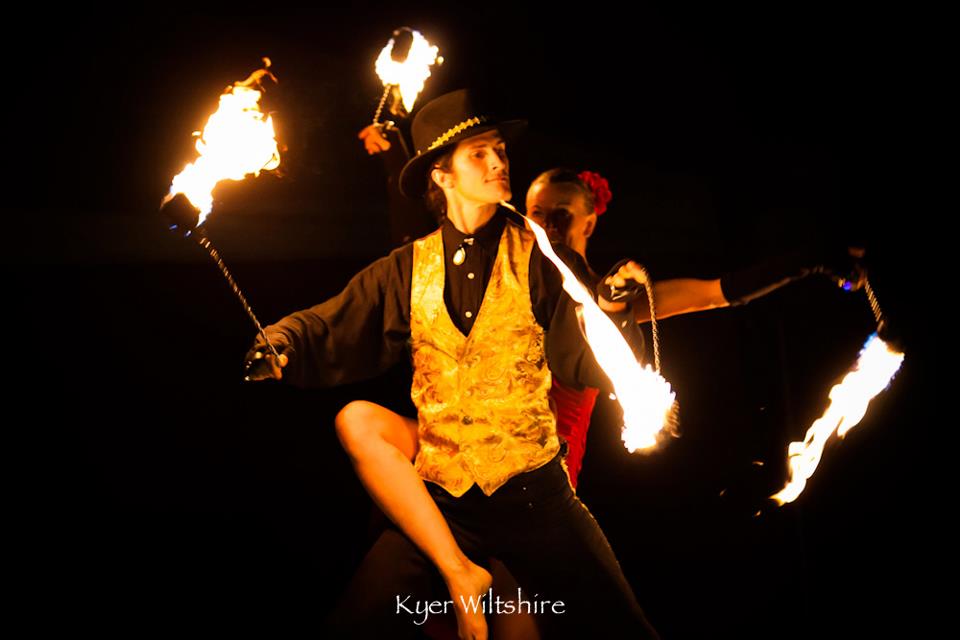
photo by Kyer Wilshire
FF – Were you part of the founding of Fire Drums also?
Z – I didn’t found Fire Drums, in fact, it started as a very small event that was just an organized camp out essentially. At first they said “everyone reserve your spot at this big campground and we’ll all show up.” That was about all the event entailed. There also were no workshops at that time, it was a just go hang out with your friends weekend. It evolved over time and I joined in about 3 or 4 years into it, when they’d just moved to a new larger venue. I helped teach the very first workshop that ever existed, which again, has become one of the primary focuses of these events. Then, after working with Fire Drums for around 7 years…
I’d lived in Oregon for some time. I would drive down (about 12 hours) to get to this event and then drive 12 hours back. I was talking to my Seattle friends who would drive even longer to get there, and I said, “Why don’t we just set up our own?”. Pacific Fire is a sister event, like a little seedling deposited by Fire Drums, the hub event, again the largest in the country. We have a hub event, and it also has spawned regional events. Many people can’t go that far, spend that much or they want more of it and they’ll do both.
I started the event with that in mind. We wanted a regional gathering for Flow Artists and Fire Spinners in the Pacific Northwest, something that didn’t exist.
FF – Then the other two spawned as well?
Z – Yes, it’s the idea of gathering. Basically, they have enough interest in the south to have their own event and in the Northeast we don’t have an event yet, but that’s because they have their own unaffiliated set of gatherings now, there are a few already organized.
FF – Specifically Flow Arts?
Z – Yes, Wild Fire Retreat is the one that’s been going for some time and it was inspired by Fire Drums too. They came out to Fire Drums, really enjoyed it and asked if we’d be ok if they started something similar. Its unaffiliated, but it is family. We are a small enough sub group of the general population that we have to stick together and support vendors and makers of fire tools and fireproof clothing and so on.
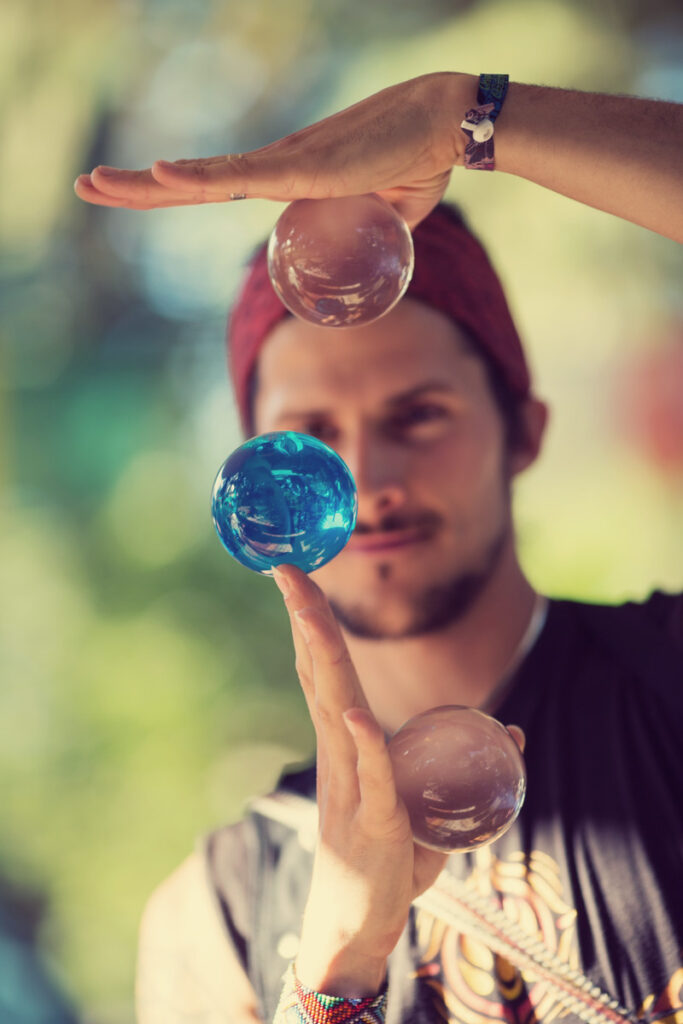
photo by Zipphora Lomax
FF – You said the overall movement is quite small, but I go to fests all over the place and there are circus arts and fire dancing everywhere, in bigger and bigger numbers. At every kind of event, even the bigger mainstream events and some of the city street fairs, they are starting to show circus arts. The youth culture is embracing it tremendously.
Z – It is dramatic, especially when you note that the history of fire dancing in this country is literally less than 20 years old. Even as recently at 10 years ago, it was just a handful of people. I have friends who say that even at Burning Man, across the Playa you could see someone spinning fire and you would know who it was by the pattern they were making. There were only a few and they were all friends. Now at Burning Man there are hundreds out there!
So its growing exponentially, but my point again, is it’s a minority. Its increasing in popularity, but if I were putting up a festival that was a music festival, I would say, “Lets sell 3000 tickets”, whereas with Pacific Fire I’m trying to sell 350 tickets. We’re shooting for 400 on site, including staff.
FF – I think that this culture of Flow Arts is so exciting because in my youth it was all about drugs and rebellion, and it was very destructive. The thing about Flow Arts is that it takes a lot of discipline, fitness, really good things for people to be focusing on, as well as community and cooperation.
Z – Having had the opportunity to meet most of the best fire dancers in the world, (I’ve traveled pretty extensively), I can tell you that they are great people. There is something related, the way you have to train your mind and body and this dissolving of the ego. You don’t meet a bunch of jerks saying “I’m the best!”, it’s a really open loving culture sharing knowledge openly and I think its related to, again, the way in which we practice and what the art is about…because we’re training various patterns into our minds and bodies, updating your muscle memory, retracing patterns of sacred geometry, with light around our bodies. It seems like it is very subtly activating things within people that bring them to the next level personally. I think that’s a wonderful thing to put in the hands of our youth and our adults as well. It’s a good exercise for anyone to be humbled by a simple task and then to face a challenge and actually come out the other side with a learning experience. It gives you hope in yourself and in everyone.
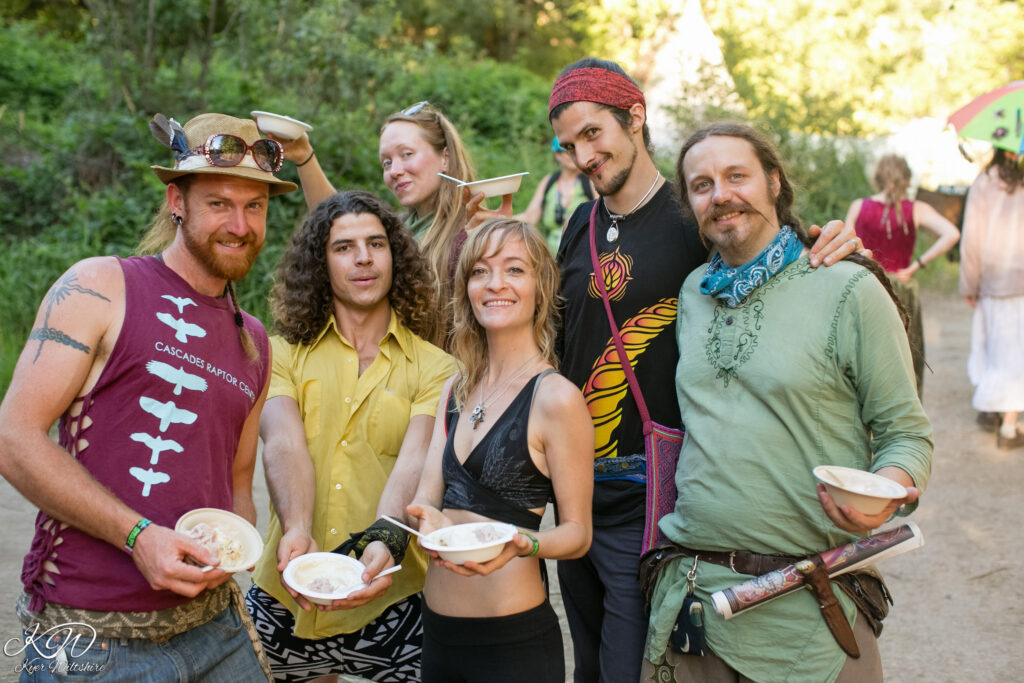
photo by Kyer Wiltshire
FF – Feel free to expound on that. Imagine there is a group of brand new kids or adults. Talk more about what you have to go through to learn these skills.
Z – I tell people that the first time you try anything, it’s difficult. It doesn’t matter if it’s riding a bike or spinning poi, you will inevitably hit yourself quite a lot at the beginning and that brings up different issues for different people. Some find it to be embarrassing or humiliating, but it comes around to being about attitude. If you have a bad attitude about how you’re learning, you make a very difficult exercise. But if you just enjoy the process of what you’re going through and realize that nothing is simple the first time you try it, that its only through putting in time like everything in life, it becomes a potent metaphor for anything we do. Spinning poi can become the way that you excel at your job, because it’s not so easy the first time it comes around, but once you build up some familiarity you can actually refine your technique and do it in a better way. It teaches us a more positive attitude and outlook in how to enter challenging situations and emerge victorious.
FF – Hmmm…People who feel better about themselves are better socially and in a group, in relationships?
Z – I grew up in team sports, in basketball and soccer and while there is some really positive comraderie with our team, there’s a very negative association of “the other team”. We’re the winners and they’re the losers and competitive team sport is the predominant modality of the youth now. So introducing something like this which is non-competitive, individually driven self comparison, where you are the only limitation to how far you can go, you can play with your friends, nobody has to lose. It’s a really potent form of exercise.
I spent some time traveling around to summer camps for kids and we would give them all poi as a way to promote healthy living, to promote exercise that didn’t make you have to run the fastest or jump the highest. We can all enjoy ourselves right now together in this same spot.
FF – Can I ask what’s the different between fire dancing and fire spinning?
Z – They are pretty interchangeable, I use the term dancing and that reflects my own personal viewpoint. In my perspective, its just not the same to do fire standing still, its obviously more fun to watch when someone’s dancing. And I would maintain that its significantly more fun to do, if you are dancing than if you are just standing there and spinning. It shifts the focus from “these are the patterns I make with this thing I’m holding”, to the idea that “these are the patterns I make with my body and the things I’m holding”. We can use the movements of our bodies to accentuate or amplify the effects that the patterns are making. It becomes more of a true art form in a way. Aesthetically, everything is linked through motion and through line as a time sculpture. If you think of a performance piece over time, if you catalog and draw out all the movements to encapsulate an energetic event, it’s much more potent if you have that play back and forth between the patterns of light and the patterns of the body, and the synchronization of the footwork with the timing of the music and the timing of the spinning. So, fire dancing and fire spinning are fairly interchangeable, but I prefer to reflect the fact that there’s always a higher level we can achieve with the pursuits that we have. For many people who have come up in a traditional fire spinning type of scenario, it’s a big breakthrough to realize, “I have a lot more to practice besides just my tricks”. I actually have to practice my footwork and train my flexibility to take this art to the next level. That again, deepens that personal development. People become more aware of themselves, of what their body is like in the environment it interacts with and the space around them and how to move through it.
FF – Do you extend that conversation to the group in working together? The way they cooperate?
Z – For all we are, we are a pretty philosophical group. There are a lot of conversations about Flow and what that really means. It has so many definitions that are all inter-related. Obviously we have the flow of water and the flow of energy, but there is also flow which is the psychological state that is described by full emersion in what you’re doing, heightened creativity and loss of a sense of time. If you aren’t familiar with it, there is some pretty fascinating research that’s been done, psychological studies on the flow state. I think that is the closest relation to what we mean by Flow Arts. We’re talking about things that immerse you fully in the moment, where you no longer perceive distractions because the challenge of what you’re facing in the immediate is precisely equivalent to the skills that you have. There’s a feedback loop between what you’re doing and then you can see the results of it, and it pushes you to the edge of what you’re capable of, more or less continuously. It brings you into that state of “flow”.
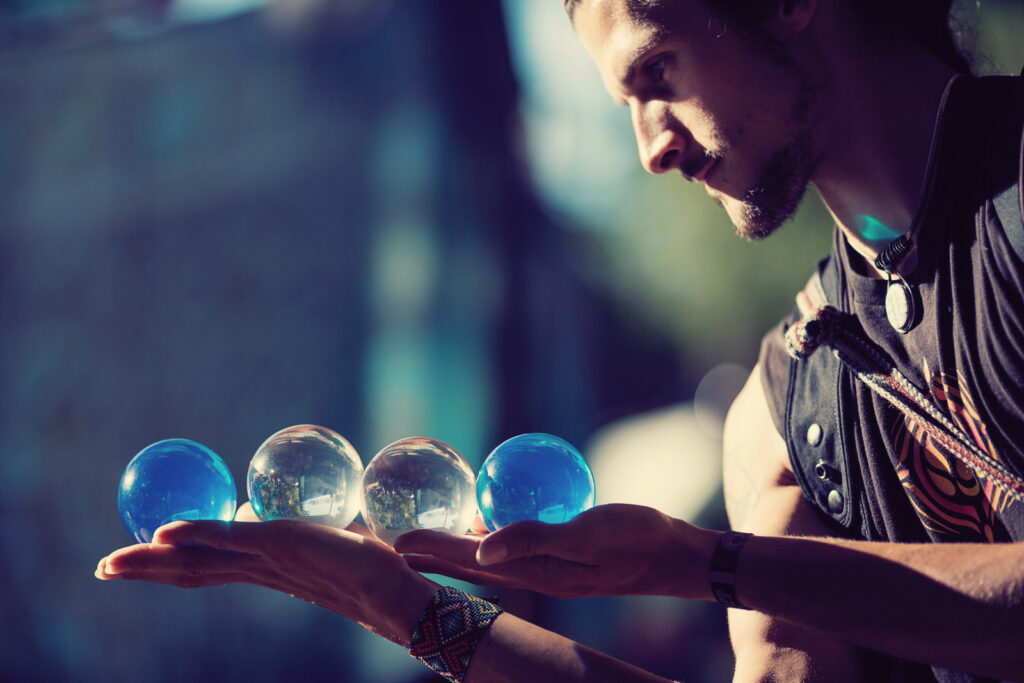
photo by Zipphora Lomax
We have a lot of conversations about Flow. We have conversations about fire and what that means as an element. The potency of fire as transformation and fire as inspiration, passion. Those things are represented at the gathering. The workshops aren’t just technically based. Though there are quite a few that are “come learn how to do this type of flow”, or movement or trick, but there are also some that are just lecture based classes. There are Flow and Sacred Geometry classes, and there was one on fire spinning and herbalism that involved sampling of different herbal tinctures and then flowing, to experience what it was like to work with each plant.
My personal take on it and in the workshops is, I feel that the technical aspects are pretty well covered, so although I’m quite competent in how to execute the skills of fire dancing, I leave that for other people and I take a tact of finding something that isn’t being taught. I do a lot of group play type workshops where I am just a facilitator, where everyone comes and we just play a series of games that involve us having our props in our hands, but the focus is on not doing tricks and not watching your hands. Keeping your head up and making eye contact with people and moving around through the same space. So we play games of using the space that no one else is in, and kind of weaving through this lighting mass of limbs and props, which is pretty fun and also just some imagination games like we’re children again. All these things I use to break people out of the box of “I’m a fire spinner and I need to do what looks cool”, or what’s the newest move? And that fosters the idea that we’re here together right now in this moment and what can we create?
These tools are extensions of ourselves, a staff or poi or hula hoop, it’s not just a prop or an object, it’s actually an extension of ourselves. Through our para-personal awareness, we become moreengaged with the environment around us. Just as when you’re driving a car, you have some awareness of where the edges of the car are so you don’t run into things and so you can park it well; in the same way, when you become familiar with spinning poi its almost like its just another joint in your arm. You can start to know and feel where it is without actually looking at it, without receiving the visual data. So this is training that expands our para-personal awareness. To put all these people mashed into one space, spinning all around each other is actually furthering that development of skills. While everyone is really smiling and giggling and having fun, it breaks open the boundaries of what they thought could it be used for, it expands the possibilities of how it can be an extension of their body on more than just the physical plane.
FF – That sounds like it’s world changing. Then they go back out into the community and they’re bringing light and they’re bringing goodness back into the world.
Z – Absolutely. I often get the feedback, “Wow, that was just the class I needed”. Again, I don’t really feel like I taught very much, we just had a good time together. They just needed permission to allow that to happen. They needed someone to say, “It’s ok, this is also the appropriate thing to do”. Everyone is panting and out of breath, and smiling and giggling and they’re making animal noises, it’s a good time.
FF – It sounds like you are introducing another perspective that’s much higher, and more open, you really are doing something. You’re giving them the opportunity of transformation, to change the way they live on the planet.
Z – It’s a fairly diverse gathering in that way. It’s a choose your own adventure. If you want to learn a new prop you can focus on those classes. And then there are some others called Ninja games, or Zen games that are a series of playable exercises. A lot of those take place in the lodge, we have an enormous lodge that can seat 600 people for dinner, so we take out all the furniture and have a huge open space. Sometimes we have 3 or 4 classes going on in there at once. There might be yoga, and acrobalance, there’s breakdancing and top blocking class, all kinds of different dance and movement arts.
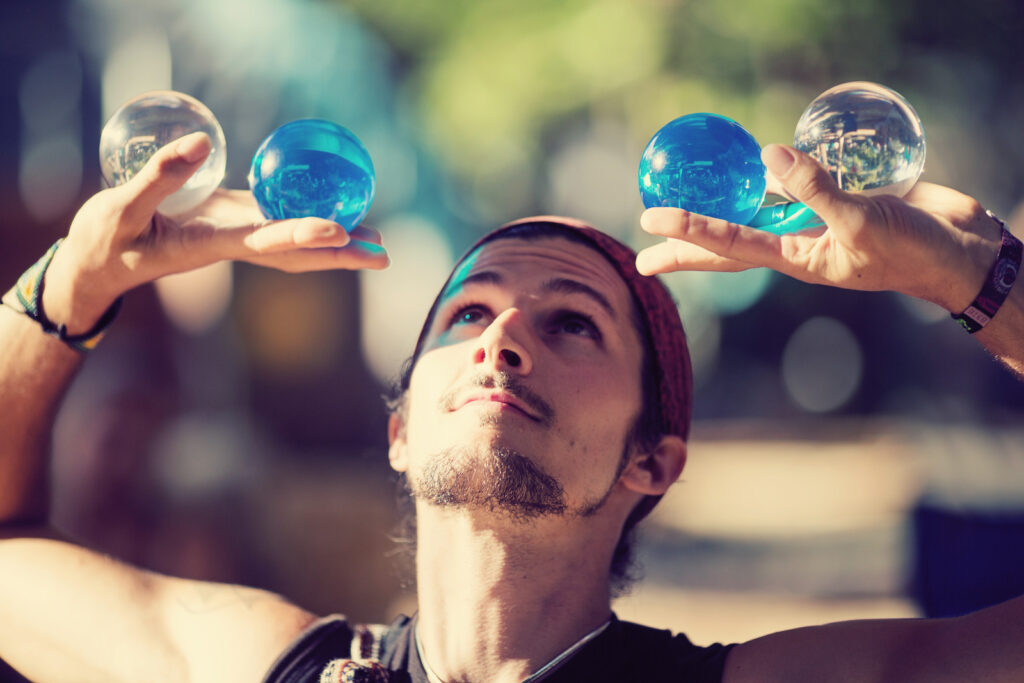
photo by Zipphora Lomax
FF – Where do you see this movement going? What do you see emerging now?
Z – I think the vision that a lot of us have held, is that eventually this will hit the mainstream in a way that’s similar to yoga. At one point yoga was very weird, it was pretty far out and only some people did it and it wasn’t very widely accepted. It was seen as mystical and eventually it hit some kind of critical mass where at this point everyone has had some sort of experience with yoga. Even if its only peripherally, or a friend they knew that did it, when you say “yoga” they already know what it means and they have a picture of what its about and when they take a class, they might take classes for a whole year. That is really main stream. So maybe we could hit that. So when someone says “circus”, you don’t picture Barnum and Bailey, you picture the time that you went and climbed around on that hoop that was hanging in the air. Or if someone says “poi”, maybe poi could become such a household term that it’s pretty common for people to have them. Everyone seeing that this is something that has value and a lot of practical applications, for enjoyment and personal fulfillment, personal growth, group collaboration and creativity. We can use these things in our general culture to improve the quality of our lives. That would be, to me the idealized future.
FF – I don’t think that’s a far fetched idea in that we are at an exponential time right now where things that change the way we live are being embraced. Where I live circus has grown so much that when a band takes an intermission, there is a circus act, or at restaurants or an event where the mayor speaks, there’s a circus break, all kinds of things. The soccer moms are taking circus arts classes for fitness.
Z – That’s why we’re starting to move away from the language of fire dancing. I’ve been a professional fire dancer for 8 years but I don’t actually spin fire that much. Pretty much only when I get paid to and somebody really wants it. In my own practice, and places I go and when I want to play and spin to enjoy myself, I almost never do it with fire. Partly because there’s more to it, and I have to buy fuel and I get dirty and its toxic and I smell like burnt hair and all that. It’s still worth it from time to time but the majority of time we don’t play with fire. That’s why we’re trying to rework the branding into Flow Arts because it’s not specifically about the fire.
The idea is just overall recognizing that we want people with those kinds of skills and enjoy having them around and it really doesn’t matter what category they’re under. They don’t have to be a circus artist or a fire dancer, they’re just entertainers. Cirque Nuevo has been gaining traction, new acrobatic artistic performers that are dancers that tell a story and tightly choreographed to music. I think that is really positive.
FF – Do you see yourself as a key person overseeing the movement?
Z – My idea is that, I really love festivals, they’ve had a dramatic impact on the course of my life and my outlook. But as much as possible, I remember the people that are less fortunate than ourselves. It takes quite a bit sometimes to take the time off to go to festival, to spend the money on a ticket and food and travel, it’s resource intensive. We are so blessed to be able to make it happen in our lives. But there are a lot of people, not only around us here who don’t have the means or the ability to enjoy such a thing, but also around the world. A great number of people that don’t have the blessings that we have. So in the time that we’re not at festivals, really thinking about how we can reach back out to help everybody. I have experienced that you come home from the festival and wow, it’s hard to relate with these people who didn’t share the experience I have just had. It can almost be withdrawing, the opposite of what it is supposed to do. It’s supposed to make us more connected to other people and more into our power, to encourage creative group expression, and to draw people out of their shells in their daily lives. It can be difficult and it’s a real practice. That is the work that we’re called to do. To take it beyond the festival grounds out to the people who don’t have that connection and may not be able to make that connection…to actually bring out what this is all about. I don’t see festival culture being a rebellion form authority, I think that we’re all in this together for better or for worse – cooperation is the way of the universe and the only reason the moon is shining is because it’s cooperating with the light from the sun. We have to take this and turn it into a form that can reach everybody all the time. And not just reach some people on weekends in the summer.
Please encourage people to come check out Pacific Fire, you don’t have to be able to do these things yet, we’ll teach you, that’s what it’s all about. We have all kinds of classes at every level, and shows and music and the best part of it really is the venue. We have a private beach and forest and we go mushroom hunting in the woods, swim in the ocean. It’s an idyllic weekend.
Learn about more Flow Arts Gatherings on our Flow Arts Calendar at https://festivalfire.com/festivals/flow-arts-regionals/
